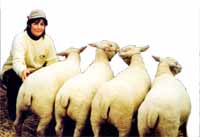Sheep – through rose-tinted spectacles

Every year at this time I get what my husband calls “withdrawal symptoms”. They’re brought on by not having any sheep in my life any more.
The fact that all those cold winter nights spent huddled on a straw stack in the lambing shed have turned from freezing, exhausting, depressing (sometimes) weeks, into wonderful, magical, fulfilling challenges, is all down to the passage of time and my self-denial regarding age and arthritis.
I do remember the bad lambings, the stillborn lambs, the lambs that wouldn’t suck, the prolapsing ewes and the ewes who didn’t want their lambs – or anyone else’s.
Sheep orphans
I remember my children calling themselves “sheep orphans” and all the other things that could go wrong that you thought you’d prepared for and found you hadn’t. And the humiliation of an offspring offering to fetch a loaf to stop me going in the shop, saying: “You smell terrible, Mother!”
Nevertheless, it happens every year. I look in people’s fields at ewes with round bellies, sore feet, funny shaped udders etc and wish they were mine.
To cap it all, Farmers Weekly runs pages of how to have a successful lambing with pictures in living colour. Do they have no consideration for us poor no-longer-lambers and what they are doing to the level of our misery at this most miserable time of the year?
Things have certainly moved on, with advice on technology and sheep-friendly systems abounding.
What I remember is rather different. I remember pens with solid sides to avoid mismothering and my husband taking the base off an old pushchair and building a “lamb pram” – a weldmesh frame to put lambs born outside in – so the ewe could see them and follow.
I remember putting pots of colostrum in the freezer to later defrost in warm water (no microwave in those days), and the sinking feeling when you noticed a twin not with its mother when she was suckling the other.
I remember scanning being very expensive and not too reliable, so we mostly risked the odd big single or little triplets – sounds primitive now, doesn’t it?
Then there was lambs in the Rayburn. Heat lamps that scorched the ewe’s bottom but did nothing for the lambs. And recording everything in our little book at 3am.
We tried to avoid skinning lambs – and preferred dunking in birth fluid, tying the feet together and removing her own lamb until she had properly licked the trick one. All very stressful, not to mention the lamb-adopter pen – and I won’t.
There was the foot shears versus penknife choice. Either can draw blood – the animal’s or yours.
And the sheep turner that has been known to take people (me) off their feet, as well as reluctant ewes, with cracked ribs as the result. I blame my husband for all these things as he is always the one spotting new ideas.
Wonderful life
It was, however, a wonderful life. Nothing better than getting top price in May for January lambs, or watching them in March dancing round the field in the sunshine. Head-first lambs; mixed-up legs of twins; tails only. Get the baler twine and the gel; close your eyes and imagine the inside of the ewe; keep calm and what a feeling when it worked and you didn’t need to call the vet.
Did we ever have weeks of rain and frost – I don’t remember. I do, really, but that seems irrelevant now.
Did we have ewes on their backs before clipping, or fly strike? Surely not. Those were the days when we dipped twice a year holding the ewe’s head under the water to kill the bugs – kill the ewe more likely, and no warning to cover yourself against a biological warfare situation, just wellies, rubber gloves and shorts and T-shirts in the hot sunshine.
We imported some Charollais ewes and rams. But surely, they were never going to take off – not weather-proof compared with the Devon Longwools anyway. But eventually meat instead of fat and wool took precedence, so never mind the funny faces and thin legs.
Local showing successes followed, entailing quite a lot of washing-up liquid and training the sheep to like hair dryers. We had a lot of fun then.
We have retired now and the cynic in me says I couldn’t do the form filling and I certainly wouldn’t feel good about being paid not to farm the best we could.
Good living
We had kingfishers, herons, hares, deer, otters, badgers (before TB), foxes (good hunting days), and all without legislation or regulation. We still made a good living and, if all things were equal, I would do it all again.
But they are not equal and I’m more than 20 years older, so bring on the rose-tinted spectacles and I’ll get out my old diaries and photos until the weather gets better and I replace the lambing shed with the garden.
However, if anyone is looking for an ageing shepherdess who can’t run after ewes, or kneel in the lambing pens, but sorely misses the buzz, I’m your woman.
No I thought not.
